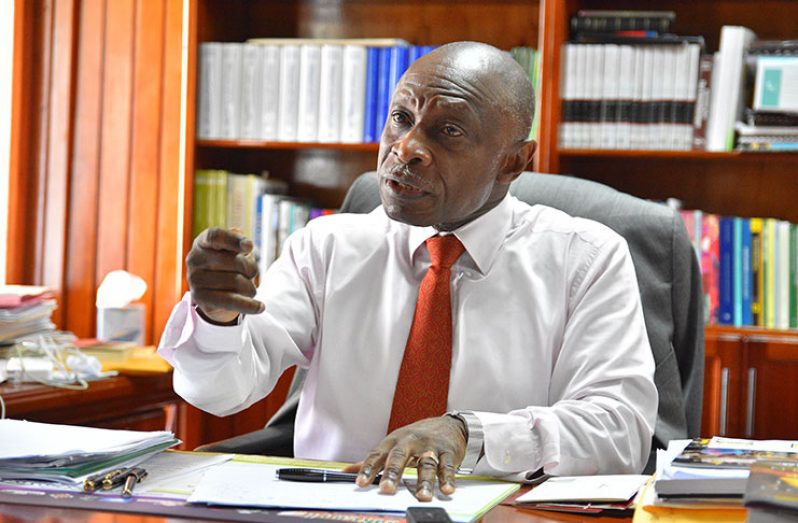AFTER months of lobbying on the international stage, Guyana has been removed from the European Union (EU) Money-Laundering Blacklist, Foreign Affairs Minister Carl Greenidge has disclosed.
In May, 2017, the European Commission had proposed that Guyana be removed from the Money-Laundering Blacklist and Ethiopia be added, but for a second time that year, the European Parliament rejected the list – a move which received stern objection from this side of the world. Guyana was grouped with countries like Afghanistan, Iraq, Syria, Uganda and Iran among others.
Guyana, however, has since been removed from the list. In a recent interview with Guyana Chronicle, the Foreign Affairs Minister disclosed that the European Parliament late last year adopted a new list from the commission that excludes Guyana. “In November, we had received from the Ambassador in Brussels some information that the European Union has been able in relation to these lists to remove Guyana, and that is something we are very pleased about,” Minister Greenidge told this newspaper.
Under the EU’s Anti-Money Laundering Directive, the Commission is responsible for producing an inventory of countries thought to be at risk of money laundering, tax evasion and terrorism financing. People and legal entities from blacklisted countries face tougher than usual checks when doing business in the EU. In compiling these lists, the Commission depends heavily on the international body, the Financial Action Task Force (FATF).
In putting the issue into prospective, the Foreign Affairs Minister explained that the European Commission had recommended that Guyana be removed from the Money Laundering Blacklist because it had made significant progress in addressing the deficiencies within its Anti-Money Laundering and Countering the Financing of Terrorism (AML/CFT) regime.
He said though, the commission had made the recommendation to have Guyana effectively removed from the list, the European Parliament objected, not to Guyana’s removal but to the entire list.
Guyana, he said, approached the European Commission on the matter, and was informed that the problem did not arise at their level but at that of the Parliament. The matter was being treated as an internal problem between the Commission and the European Parliament.
The country’s leaders then met with a prominent EU Parliamentarian in Brussels, Belgium and subsequently dispatched a letter on the matter. “In our discussions with them, I think it fair to say that they admitted that this was not meant to be an attack on Guyana, they recognized that it would have damaging effects in terms of how countries regarded us as a risk and banks in particular,” Minister Greenidge said.
Shortly after the European Parliament’s non-support of Guyana’s removal from the Money-Laundering Blacklist, President Granger had called for a speedy resolution of the issue, stating that the country had done everything to comply with international best practices relating to open, transparent and responsible government.
Though the President the European Legislator for the explanation offered, (the same told by the Foreign Affairs Minister) he noted that while the EU is blinking, Guyana is bleeding.
For the Foreign Affairs Minister, Guyana should not have been on the list “in the first place.”
“We are saying to the European Union as a whole this is nonsense,” Minister Greenidge argued noting that the European Union – a member of FATF – is one of the most important influences in the world. “We have met the requirements of FATF, we have met the requirements of CFATF, and yet you now apply additional rules. So you are party to the big rules and when people have met those rules and obligations, you sit down in your space and put in place additional obligations, this is not transparent, it is not fair and therefore we urged you to address that,” the Foreign Affairs Minister said.
When CFATF XLVI Plenary and Working Group Meetings were held here last November, Guyana was praised for the progress made in addressing the loopholes in its AML/CFT regime. “The important starting point is the fact that Guyana in a very short space of time passed a suite of legislation which resulted in them being taken off the FATF list and also being reviewed by the CFATF, and that was a commendable achievement for the Government and people of Guyana, led by your Attorney General, who is the Deputy Chair of the CFATF–the honourable Basil Williams,” CFATF Executive Director, Calvin Wilson had told this newspaper.
In May 2014, CFATF had handed over Guyana to the Financial Action Task Force (FATF) due to the country’s failure at the time to meet the agreed timelines in its Action Plan.
However, starting from 2015, the country was able to make significant progress, resulting in it being removed from FATF’s watch list in October 2016. Currently, Guyana has an Anti-Money Laundering and Countering the Financing of Terrorism (AML/CFT) Act in place, along with other related legislation governing supervisory bodies, financial institutions, law enforcement, and foreign affairs. In 2022, the country will undergo CFATF’s 4TH Round of Mutual Evaluation to determine its effectiveness in addressing the deficiencies. The 3RD Round of Mutual Evaluation had focused on the legal and regulatory framework of the country with respect to its AML/CFT regime.




.png)









